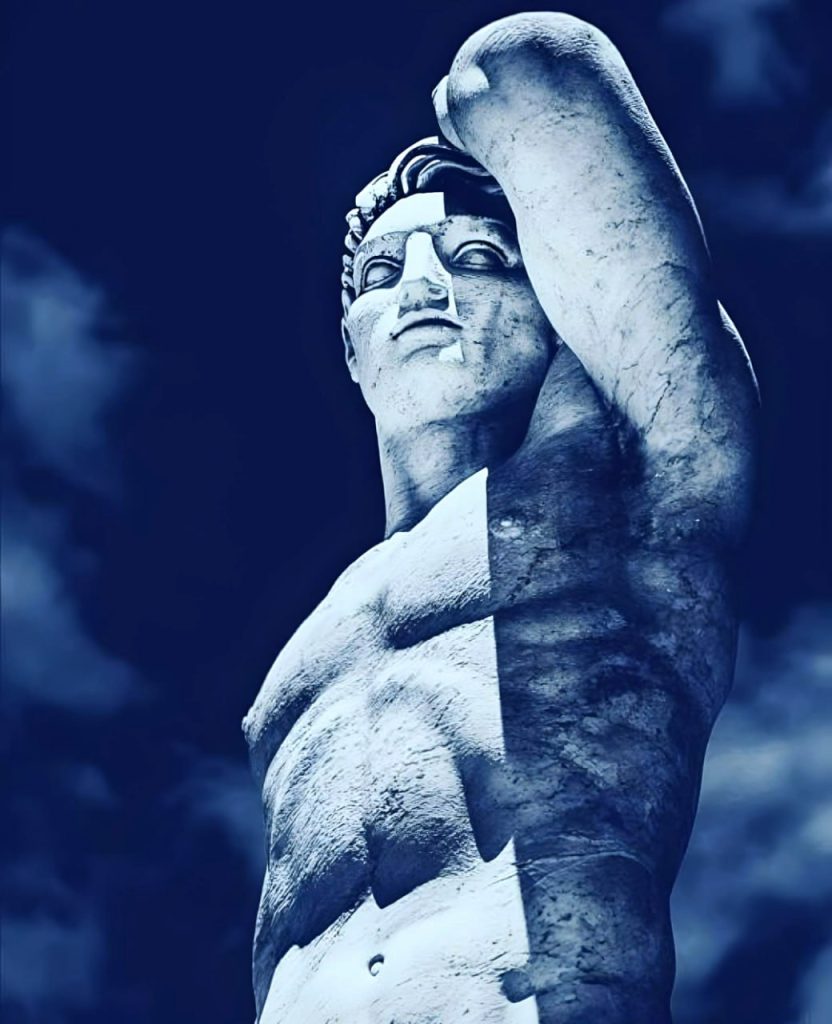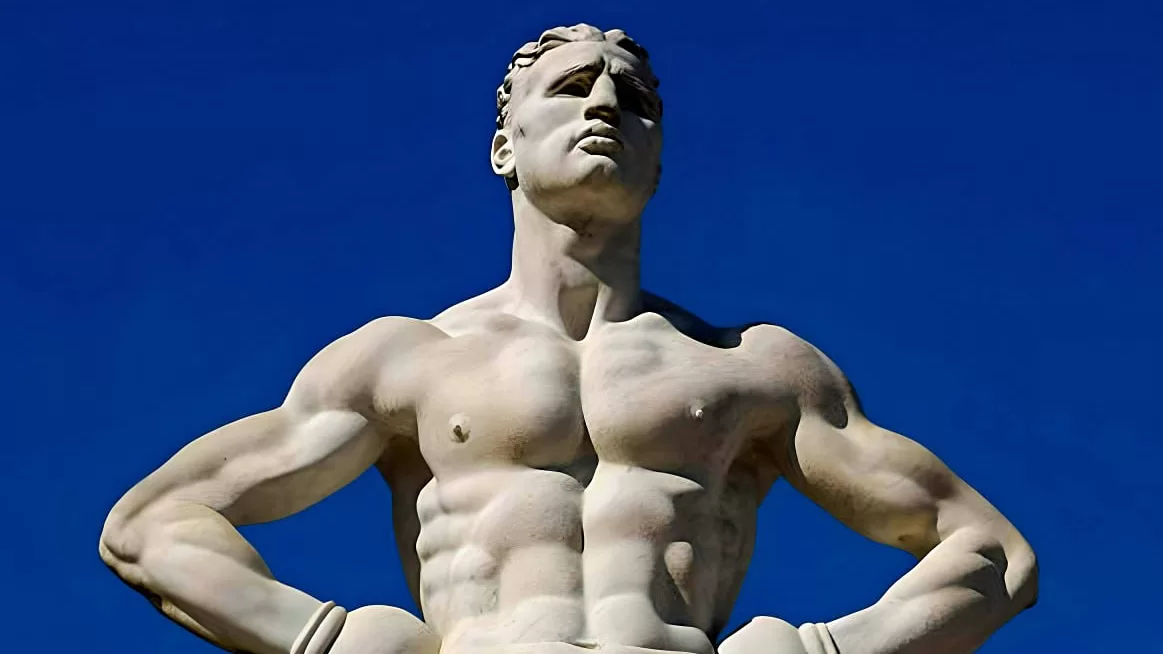Within the philosophical foundations of Italian Fascism, a striking motif arises – the conceptualization of war as a revolutionary act capable of igniting societal transformation and heralding a process of national rebirth. In Benito Mussolini’s “The Doctrine of Fascism,” Il Duce emphasizes the profound transformative influence of the First World War on Italy. He posits that this war unveiled the inherent weaknesses of liberalism, culminating in its downfall and laying the groundwork for the “national revolution” unfolding in 1920s Italy. Mussolini asserts that the Fascists did not believe in perpetual peace, for war “keys up all human energies,” and, as such, it was a spiritual manifestation of the “vital energy of a people.”
Hailing from the profound depths of ancient Greek thought, the notion of war’s vitalistic and transformative essence remains indomitable. The ancient Greeks, with their keen agonistic worldview, epitomized this belief – a philosophy rooted in the term agon (ἀγών), denoting both “contest” and “struggle.” Beyond a mere appreciation for competition, this perspective celebrated conflict and tension as driving forces capable of sculpting a society, forging new ideas, propelling personal and collective growth, and advancing knowledge. War was the embodiment of this agonistic spirit. Luminaries like Aristotle and Thucydides, while recognizing war’s ubiquity, offered varied interpretations. For the ancient Greeks, warfare was not just about battle; it was a stage to showcase individual and communal vigor and competitiveness. To partake in such a struggle was to manifest one’s inner heroism, deeply interwoven with ideals of citizenship, patriotism, and defense of the cherished polis (city-state). Mussolini, recognizing the “vitalistic energy” of war as a revolutionary act, perceived Italian Fascism as bearing the torch of this ancient and heroic legacy.
Echoing from the annals of ancient thought, the concept of war’s vitalistic essence as a revolutionary force resonates powerfully within Fascist philosophy and its allied art movement, Futurism. Giovanni Papini, the esteemed Italian intellectual (1881–1956), eloquently captured this sentiment regarding war’s transformative capacities, especially in the context of birthing a new elite:
Italy, even if it was no longer a geographical expression, was quickly becoming a metaphysical expression. A great power, but the weakest of all, armed, but incapable of waging war; full of social unrest, but with no serious will to change regime; conservative, but spineless whenever there was a hint of threat to stability. … Others have brought our country into a terrible state: the least they can do is let us make the effort to raise her up again. The war will not suffice. But it is enough to start with. Afterwards there will be a total change in the ruling classes, of the caste which holds power.
The more bombastic Italian poet and founder of the Futurist movement, Filippo Tommaso Emilio Marinetti (1876–1944), fervently held that war could cleanse away the remnants of the old order, rekindle Italy’s spirit, and compel the nation to derive strength from its present vitality rather than merely bask in bygone glories. He articulated this vision, writing:
The war will sweep from power all her foes: diplomats, professors, philosophers, archaeologists, critics, cultural obsession, Greek, Latin, history, senilism, museums, libraries, the tourist industry. … The war will rejuvenate Italy, enrich her with men of action, will force her to live no longer off the past, off the ruins and the mild climate, but off her own national forces.
To put it succinctly, the natural consequence of war, encapsulating revolutionary transformation, entailed the replacement of the existing decadent political class by a new class of “elites” – the frontline soldiers who had endured the anguish of war and fought for the glory of the Italian patria (“Fatherland”). This notion bears striking resemblance to Plato’s idealized conception of the Republic, where auxiliaries would protect the State and the Philosopher King from the passions of the average citizen and the members of the producer class, who, in the modern sense, represent financial interests that fund political corruption and denigrate the political process. In essence, the established political power-brokers, be they liberal, conservative, or socialist, would be replaced by a new “nobility” forged in the fiery inferno that was the First World War.
In the newspaper Il Popolo d’Italia (“The People of Italy”), Mussolini framed the ascension of this new elite class of warrior-fighters as the “trenchocrats,” writing that the “trenchocracy is the aristocracy of the trenches. It is the aristocracy of tomorrow! It is the aristocracy in action.” Mussolini further elaborated on this new nobility, stating,
The brutal and bloody apprenticeship of the trenches will mean something. It will mean more courage, more faith, more tenacity. … The words republic, democracy, radicalism, liberalism, and even socialism itself, have no sense any longer: they will have one tomorrow, but it will be one given to them by the millions of those who have returned.
Fascism champions the cultivation of the “New Man” – a resolute and dynamic archetype epitomized by direct action, aggressive violence, and a staunch rejection of atomized individualism. The concept of the trenchocracy serves as a manifestation of the Fascist philosophical ideal of the “Fascist New Man” (Uomo Nuovo Fascista), symbolizing a seismic shift in societal values and perceptions. The Fascist New Man radiates an aura of steely masculinity, quiet dignity, and unwavering self-worth. Fueled by relentless resolve and commanding authority, he transcends traditional familial and educational bounds. Instead, he adopts a romanticized, passionate, serious, and pragmatic worldview that venerates the valor of fallen heroes, extols personal accountability, and cherishes the communal spirit essential for national rebirth and renewal. Within this disciplined collective, the Fascist New Man relinquishes individualistic tendencies, partisan politics, discriminatory attitudes, and class divisions. This unified para-militaristic effort embodies the transformative power of the Fascist ideology and its metamorphic essence. As the vanguard of societal change, the Fascist New Man represents a revolutionary force that strives to reshape society, establishing a new order characterized by noble self-sacrifice and an intense dedication to national rejuvenation.
While some may dismiss the impassioned speeches and contemplations of Fascist philosophers as mere propaganda, the tangible initiatives undertaken in Fascist Italy to actualize the vision of the trenchocracy stand as a testament to the regime’s steadfast dedication to its ideological tenets. A cursory examination of Fascist Italy’s leadership reveals the prevalence of veterans in influential positions. Il Duce himself, along with prominent figures such as the Ministers of Foreign Affairs Dino Grandi and Galeazzo Ciano, were veterans, and exemplified this trend. Noteworthy veterans like syndicalist and Under-Secretary of Government Michele Bianchi, as well as other esteemed government officials including Cesare De Vecchi, Emilio De Bono, Roberto Farinacci, Achille Starace, and Italo Balbo, held positions of power. Additionally, the enactment of the “Grand Fascist Council Law” in 1928 included a stipulation ensuring a sizable quota of seats in both the Senate (Senato del Regno, Italy’s upper chamber) and the Chamber of Deputies (Camera dei Deputati, Italy’s lower chamber) were earmarked specifically for combat veterans.
Deeply anchored within the philosophical bedrock and leadership hierarchy of Fascist Italy was a potent reverence for war as a revolutionary force of unparalleled magnitude. This conviction, merged with the ascent of battle-hardened veterans to seats of power, epitomizes the regime’s unyielding commitment to envisioning a reborn nation. Yet, amidst these towering aspirations and dedication to rekindle Italy’s glory, the nation grappled with the stark reality of defeat in the Second World War. The revolutionary ideals and the dedication of its warrior-fighters proved insufficient to alter the course of events on the battlefield. Italy, despite its ambitions and aspirations, succumbed to a series of disastrous military setbacks and geopolitical complexities that tipped the scales against its favor.
The defeat of Fascist Italy yields profound insights into the complex interplay between ideology, martial prowess, and the often-capricious nature of global conflicts. This pivotal moment reminds us that even the grandest of visions can confront daunting challenges, and underscores the sobering realization that, notwithstanding unshakeable dedication and immense sacrifices, battlefields can be ruthless and merciless. Fascist Italy’s aspirations for a reborn nation have etched a permanent legacy, serving as an enduring testament to the multifaceted realities of warfare. Reflecting on this chapter of history, we gain a deeper understanding of the nuanced tapestry of historical events and the invaluable lessons they offer. By immersing ourselves in the annals of the past, we are endowed with the wisdom and foresight to carve a future replete with greater glory and distinction.










